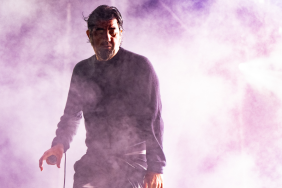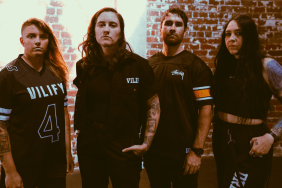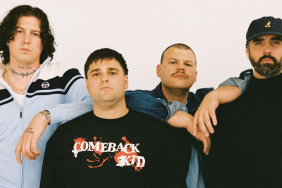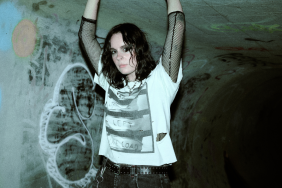Last November saw the release of the Deftones latest record Koi No Yokan. The album marks the seventh studio album from the alternative metal outfit and the second release from the Deftones since bassist Sergio Vega joined the band.
Having the unenviable task of filling the void left by original bassist Chi Cheng, who was seriously injured in an automobile accident in 2008, Vega has risen to the occasion, thanks to his unwavering work ethic and his remaining mindful of the circumstances that led to his place in Deftones.
With the celebrated Californian outfit scheduled to tour Australia in May, Vega called up Music Feeds during a cold day in New York to discuss Koi No Yokan and his time with the Deftones.
Music Feeds: How did the writing and recording process of Koi No Yokan differ for you from your first record with Deftones, 2010’s Diamond Eyes?
Sergio Vega: Really there was no difference. I mean, both situations were the same. We go get a room and just start jamming. Everybody contributes and collaborates. There’s really no telling where the idea is going to come from.
I think the difference for me has been on the back end, more perception. Since I’ve been in the band longer now, people have been able to perceive my input more, like I’ve been part of this record [from] more of a writing standpoint. But actually, right from the beginning, they’re a really open group of people and we go back a long ways and basically just get into a room and just start jamming.
And then Nichols Raskulinecz was there, especially on the first record [Diamond Eyes] helping us create a [routine] of coming in at a certain time and recording all the ideas. And then going home … he would edit them and just pitch the riffs back to us. So if we ever got stuck on anything we would have a whole host of ideas that we had come up with days prior to work on. And we really ran with that …
MF: So you felt comfortable to put forth your ideas as soon as you joined the Deftones.
SV: I mean, first of all we talked about it right from the get-go. You know, we’ve been friends for awhile and they were just basically like, “We like what you do, man. We just want to make some music”.
… That’s just really how the group at large really operates. Everyone is just very interested in what everyone has to offer and what everyone has to say. And you’d be surprised how democratic it is, how supportive it is. And everyone just works really hard at getting things down, mainly because it’s just fun and putting together songs feels good and you get a sense of accomplishment. So it’s really cool.
I mean, I hear definitely, I read a lot more about people saying, as I was saying earlier, that the perception is that I had more to do with this album. But again it’s very open and very cool to work with.
MF: It sounds as though the Deftones’ writing process is very ego-free.
SV: It is, it’s really just about coming up with cool things. And everyone has a lot to offer and a lot to say. And everyone is excited to hear what the other people have to do. So it’s pretty badass.
MF: In your experience does songwriting improve when ego is taken out of the equation?
SV: I wouldn’t go so far as to say that. You know, I think there are many ways that things come together that are awesome. I think that sometimes tension can bring up good work and can make people excel and strive to be better.
Not to say that there weren’t moments, that every day was super rosy. But I think that things come together in all different ways. I think the one thing that is true of all situations is that people put in time and effort and energy.
So whether it be people battling…or people being totally open, I think that’s secondary to the fact that the effort is put forth and you just keep grinding away at things. I think that’s more important than anything, really.
MF: Speaking of effort, in a previous interview Chino (Moreno) has praised you for reinvigorating the band and improving the Deftones’ work ethic. Do you agree with his statement?
SV: (Laughs) Well, I thank him for that. It’s hard for me to say, not being in the room with them prior. I’m just thankful for being appreciated and for being around them.
I will say that I definitely bring a lot of energy to anything I’m involved with because I believe that if I’m not passionate about something personally, I kind of check out. For me that’s a big part of being involved with something…really being emotionally engaged and being excited and bringing like, a charge. And it’s not something that I feel like it’s an act, really it’s just something happens or it doesn’t, and, you know, it’s a very exciting situation [when] that feeling just occurs.
My work ethic, the way I would like to bang things out and rehash them, comes from years prior working with other people, especially the guys I worked with in Quicksand, and how hard you work to really pull together. I believe in that, in being very present and being very engaged and putting a lot of effort forth, and really just caring.
MF: With Diamond Eyes I understand Deftones only wrote enough songs to complete the album, whereas this time you guys had an abundance of ideas. Why do you think the band experienced an increased state of creativity?
SV: Really because of the structure that Nick (Raskulinecz) instilled in us, which was basically that you jam and record everything and you start piecing things together. The jamming part is very organic…and then you start to really like…be more conscious when it comes to arranging and things like that.
When we really adapted to the structure that we had, which was essentially that you show up early and turn on everything so you can record everything and you start playing. When you start doing that and start seeing the results that come from it, more [results] come from it, so it just kind of feeds itself. And the fact that people needed a system and a [method] of doing things just makes you more excited. And that actually just inspires you to come up with more ideas.
Because of the fact that we organised our ideas in such a way that we were able to copulate them in someway meant that, by virtue of that approach, a lot of riffs and a lot of things that ordinarily get lost if we didn’t have this kind of approach, we would at least get to develop and…start to get two parts together or three parts, in some cases entire songs that we could play all the way through.
I just think it’s a byproduct of the approach. The first record [Diamond Eyes] too there was a different type of … there were time constraints in such a way that when we had enough songs for the record we basically were like, ‘Alright, we’ll stop them and start to record’.
But in this situation…there wasn’t that…but also we were just working quicker and we were capitalising on any idea that came along. So there were quite a few things that we were able to play through that were things that just didn’t make the record because they never made it that far. You know, we’d get the vocals [and then] we got excited about something else that may occupy a similar space… You have a few songs coming up that were in a similar vein and the best of it still exists. There was a lot of that.
MF: Is that where [producer] Nick Raskulinecz’s guidance became a vital part of the process, in helping the band be expansive and yet keeping you guys on point?
SV: Well, I think that really with him, [his guidance] was creating the tempo. It was basically, ‘Hey, you guys we’re gonna [work] five days a week, or approximately six days a week, and we’re gonna start at this time and be done by this time’…and then record it and then chop it up and piece it together.
So even most of the time when we were doing Koi No Yokan…he was a huge part of that as well, but it was almost like the structure that he created with Diamond Eyes allowed for this to happen. So he could focus on other aspects of it, coz basically we were just writing more.
… So [we] were just able to explore tons and tons of ideas and see what really worked. So in a way he could focus more early on, on other parts of us playing around and still being able to [focus on] different facets of the experience because he had made such a great structure for Diamond Eyes.
MF: You joined Deftones under difficult circumstances. Does the plight of Chi Cheng motivate you to make the most of your opportunity with Deftones?
SV: I guess so, you know, just everything does. I’m really aware of the fact that there’s one reason why this is the situation, but I’m also aware of the fact that our friendship is long, it’s older than that. And it’s an unfortunate situation and I just feel like that…everyone feels appreciative of being in a position to be able to make [music].
And Chi’s tragedy is really like, I’m very careful that you’re not promised anything and make the most of your moment… And out of respect for the whole situation…just come and put your best foot forward.












